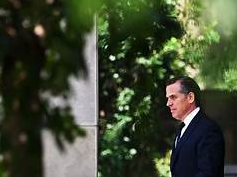Joe Biden’s treatment of his scandal-plagued son is an insult to voters – and a liability for Democrats.
At the 2019 G20 summit in Osaka, Ivanka Trump’s awkward attempt to join a conversation with world leaders like Theresa May and Angela Merkel quickly became a viral moment, sparking plenty of commentary. Fast forward to June this year, and Hunter Biden, President Joe Biden’s son, attended a White House state dinner for Indian Prime Minister Narendra Modi. While there were no viral moments from the event, Hunter’s ongoing controversy continues to dominate public attention. The pictures from the infamous laptop that Hunter abandoned in 2019 have exposed him in compromising positions, including drug use and sexual activities, as well as emails suggesting he leveraged his father’s political connections for personal business gains.
Despite this, President Biden continues to publicly defend his son. Earlier this year, the president stated, “My son has done nothing wrong. I trust him. I have faith in him.” This level of defense from the president may seem like an expression of a father’s loyalty, but it rings hollow to many voters, especially those who are already skeptical of Hunter’s actions. The public’s concern grows as President Biden’s loyalty to his son appears to blind him to the consequences of his actions on the public perception of his administration.
The images and emails that emerged from Hunter Biden’s laptop have raised significant questions about potential corruption and the abuse of political connections. The photos and emails are not just personal indiscretions but also paint a broader picture of potential ethical lapses that have become a major talking point among critics of the Biden family. For many, these revelations are not mere tabloid fodder but a serious issue of trust and accountability in politics.
The problem intensifies with the president’s continued show of support for Hunter, even as public trust in him erodes. Many are troubled by the idea that the president has used his influence to shield his son from the consequences of his actions. Furthermore, Biden’s defense of Hunter, such as his insistence on Hunter’s innocence, sends a message that suggests a lack of accountability, not just for Hunter but also for the broader issues at play within American politics.
In addition to the public perception of impropriety, there are concerns about the implications this has for the Biden administration as a whole. As the president defends his son, the scandal continues to cast a shadow over his administration, one that could be difficult to shake off in the lead-up to the 2024 election. Voters, especially those who already feel disconnected from the political establishment, may view Biden’s treatment of Hunter as emblematic of a larger problem of privilege, corruption, and a lack of transparency in the halls of power.
Critics argue that President Biden’s blind spot when it comes to his son is not only a personal issue but a political one as well. By elevating Hunter to a position of privilege despite the ongoing controversies surrounding him, the president risks alienating voters who feel that the political elite are out of touch with the struggles of ordinary Americans. The perception of nepotism, combined with the ongoing scandals, may undermine the president’s ability to effectively lead the country and rally support from the electorate.
While Biden may believe that his son is on a path to recovery, the public’s trust in that narrative is waning. It is clear that Hunter’s personal history of opportunism, alongside his ongoing behavior, is not easily reconciled with the image of an honest, transparent administration. Biden’s refusal to distance himself from his son’s scandals may ultimately prove to be a major liability for the Democrats in the upcoming election, as voters are unlikely to overlook the ethical concerns surrounding Hunter Biden’s actions.

